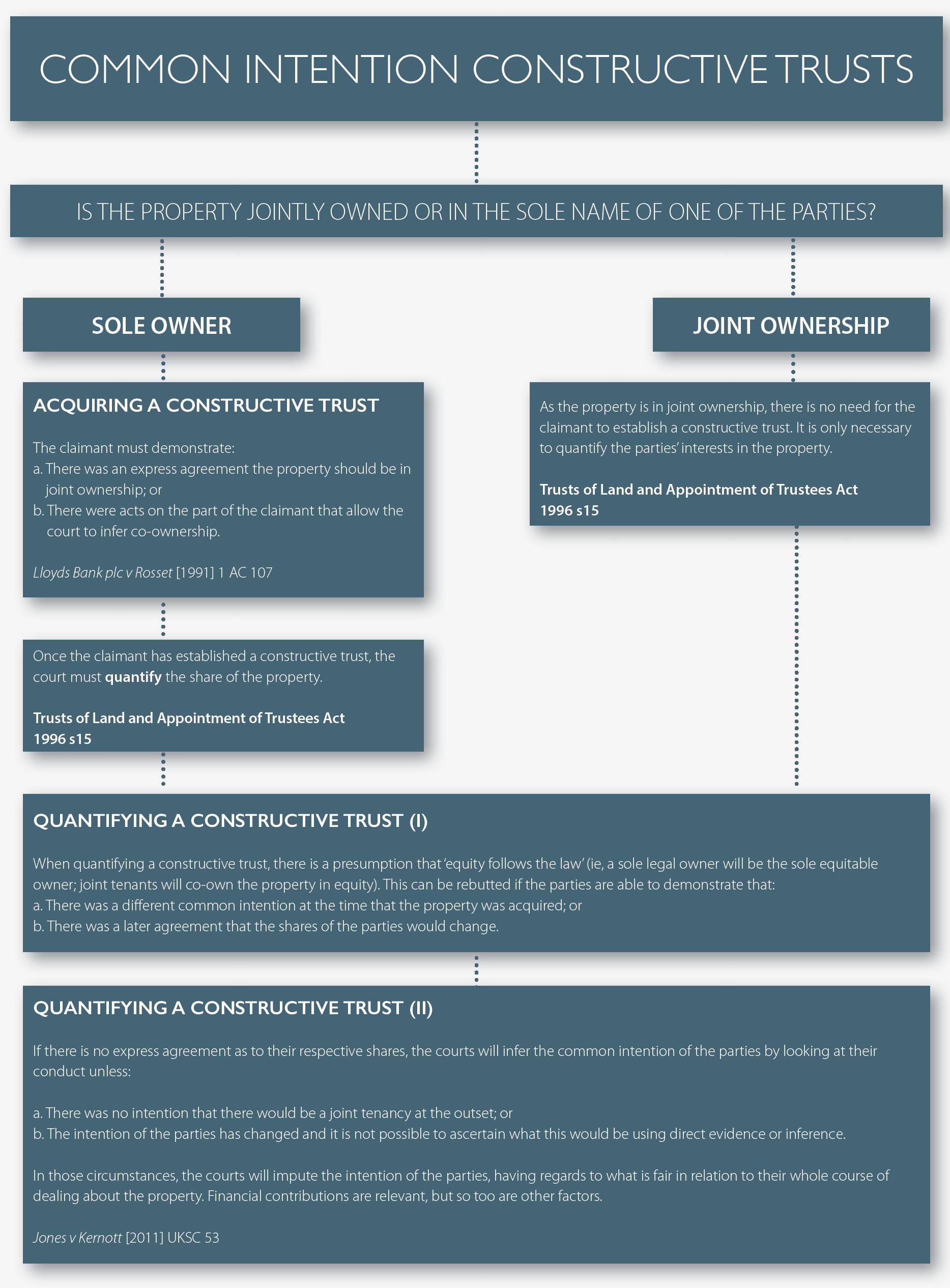Understanding What Is A Constructive Trust and Its Role in Equity Cases
Understanding What Is A Constructive Trust and Its Role in Equity Cases
Blog Article
Introducing the Benefits of a Positive Rely On Solving Beneficiary Disputes
The idea of a useful depend on becomes a crucial device in the detailed realm of beneficiary conflicts, offering a nuanced solution to disputes that often arise from wrongful residential property retention. By promoting a fiduciary connection in between events, this fair remedy not only helps with quick resolutions yet likewise offers to discourage possible misconduct. As we discover the multifaceted advantages of constructive trust funds, one might begin to examine exactly how these systems can reshape the landscape of estate disagreements and contribute to a more fair distribution of properties amongst recipients.
Definition of Constructive Trust Fund
A useful count on is regularly developed by courts to deal with situations where one event has actually wrongfully obtained or retained residential or commercial property that truly belongs to another (What Is A Constructive Trust). This lawful concept is not a traditional trust fund, as it does not need the procedures commonly related to trust production, such as a composed arrangement or the objective of the events included. Rather, a useful trust develops by operation of legislation, working as an equitable solution to avoid unjustified enrichment
The courts impose a positive depend on when it is identified that one celebration holds property under situations that, in equity and excellent principles, ought to not allow them to preserve it. Common situations entail deceptive actions, violations of fiduciary duty, or situations where an event has actually gotten residential or commercial property via incorrect means. The useful trust fund hence functions to secure the legal rights of the rightful owner by making sure that the building is held for their benefit.
Once established, the useful depend on calls for the party in belongings of the residential property to share it to the rightful proprietor, therefore correcting the wrongful scenario. This device underscores the legal system's commitment to fairness and justice in residential or commercial property disputes, emphasizing the significance of honest conduct in possession and transfer of properties.
Advantages of Positive Trust Funds
Positive trust funds offer several significant advantages in lawful disagreements including residential property civil liberties. Largely, they work as a fair treatment, allowing courts to resolve scenarios where an event has wrongfully acquired or kept residential or commercial property that rightfully belongs to an additional. This develops a structure for fairness, guaranteeing that the rightful owner is made up and the unfair enrichment of the culprit is reduced.
Furthermore, positive depends on can speed up resolution in conflicts over estate properties, consequently decreasing the typically contentious and prolonged litigation procedures connected with traditional building conflicts. Their flexibility enables courts to tailor treatments to fit the specific scenarios of each case, which can bring about more sufficient results for all events included.
In addition, constructive trust funds promote transparency and liability among fiduciaries and recipients, as they need the last to act in the most effective rate of interests of the previous. This reinforces the stability of fiduciary partnerships, fostering count on and participation. Finally, by inhibiting transgression related to residential property possession, constructive counts on add to the total security of monetary and lawful systems, making certain that residential or commercial property legal rights are valued and promoted within society.
Just How Positive Trust Funds Job

In practice, when a useful count on is imposed, the court determines the home concerned and develops a fiduciary connection between the celebrations involved. The party who holds the residential or commercial property becomes a trustee, obligated to handle it for the advantage of the rightful proprietor, referred to as the beneficiary. This relationship is not based on an official contract however rather on the principle of equity, aiming to rectify scenarios where one event's gain straight correlates with another's loss.

Study and Examples
When examining the sensible application of positive counts on, different study illustrate just how courts navigate complex scenarios including unjust enrichment. One remarkable situation is * Pettkus v. Becker *, where the Supreme Court of copyright her latest blog developed a constructive depend remedy the unjust enrichment of one event over another in a lasting relationship. The court established that the contributions of one companion to the acquisition of property validated the imposition of a useful trust, making sure fair distribution.
An additional significant instance is * Gisborne v. Gisborne *, where the court enforced a constructive depend address the insurance claims of siblings over their departed bro's estate. The court recognized the contributions made by the brother or sisters in maintaining the household residential property, resulting navigate to this site in a choice that called for the estate to account for those contributions, therefore preventing unfair enrichment.
These instances exemplify how useful trust funds can effectively fix disagreements by concentrating on fairness and the prevention of unfair enrichment. By checking out the specific contributions and scenarios of the events involved, courts can apply constructive depend accomplish simply end results, inevitably reinforcing the equitable principles underpinning these legal systems.

Actions to Establish a Useful Trust Fund
To establish a useful trust fund, a number of vital steps should be complied with to ensure that the claim is validated and lawfully identified. First, the plaintiff has to demonstrate the existence of a fiduciary partnership or a situation that calls for the charge of a constructive count on, such as scams, unjustified enrichment, or a breach of responsibility.
Second, it is vital to collect and existing compelling evidence that supports the insurance claim. This includes documentation and statements that highlight the situations causing the supposed wrongful retention of property or benefits by the trustee.
Third, the complaintant needs to web submit a petition in the suitable court, articulating the grounds for asking for the charge of a positive trust fund. This application has to lay out the specifics of the partnership and the unjustified enrichment that requires the count on.
Conclusion
In verdict, constructive depends on stand for an essential fair solution in the realm of beneficiary problems, effectively attending to wrongful building retention and avoiding unfair enrichment. Inevitably, constructive counts on advertise justness amongst beneficiaries, guaranteeing that rightful ownership is preserved and shielded.
A constructive count on is often developed by courts to resolve scenarios where one party has wrongfully obtained or kept residential property that truly belongs to another.The courts impose a constructive count on when it is identified that one celebration holds residential property under conditions that, in equity and excellent principles, need to not permit them to retain it. By discouraging misconduct related to residential or commercial property ownership, constructive trusts contribute to the total security of lawful and economic systems, making sure that home legal rights are respected and supported within society.
In technique, when a positive depend on is imposed, the court identifies the property in inquiry and develops a fiduciary connection between the events included. What Is A Constructive Trust. The court identified that the contributions of one companion to the purchase of home justified the charge of a useful count on, ensuring fair distribution
Report this page